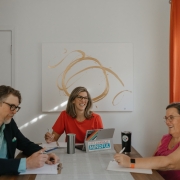Let’s recap Episode 22 of Shifting Our Sh!t (S.O.S.) Podcast: Megan and Rob catch up after Megan’s trip to the Bahamas and discuss the possibility of it being a future retreat location. Megan recently appeared on WHAS news and discussed how to focus on mental health, self-compassion, and being one’s own Valentine. They also discuss Megan’s painting, “Me and Peace,” which is inspired by her meditation on peace and reflects her thoughts on bringing peace to individuals, relationships, and larger communities.
Find inner peace.
Finding inner peace can be a difficult journey, especially in today’s world with so much chaos and stress. It can be hard to find a moment of stillness and clarity amidst the noise. However, it is possible to find inner peace and it starts with being mindful and present.
Megan Bartley and Rob Giltner, the hosts of the SOS podcast, recently discussed finding inner peace. Megan had just returned from a trip to the Bahamas, where she was able to take a break and relax. She also discussed her son Jack, who is now seven months old. With a baby in the house, Megan has to be more aware and present. This is a great reminder that even with a chaotic life, it is possible to find moments of peace.
Megan also discussed her recent appearances on WHAs with a great day live. Her topics included focusing on mental health and mindfulness in the New Year, and how to be your own Valentine and practice self-compassion. These are great topics for anyone looking to find inner peace.
Megan also discussed the artwork behind her, which is a hand folding a piece sign and the word Pax, which is the Latin word for peace. Megan has been meditating on peace and how to bring it to individuals, relationships, and communities. This is an important reminder that peace starts within ourselves and we can help spread it to others.
FIND INNER PEACE:
Finding inner peace can be a difficult journey, but it is possible. It starts with being mindful and present, and taking the time to focus on mental health and practice self-compassion. It also involves being aware of our thoughts and feelings and how they impact us and the people around us. Finally, it is important to remember that peace starts within ourselves and we can help spread it to others. With these tips, we can all find inner peace.
3 Ways to create positive emotions deliberately.
- One way to create inner peace is to deliberately create positive emotions. This means that instead of letting our emotions take over us, we can take the time to be mindful and deliberate in our thoughts and feelings. We can do this by focusing on the positive aspects of our lives and the people around us. For example, if we are feeling angry or frustrated, we can take the time to think about all the good things that are happening in our lives and the people who care about us. This can help us to shift our focus away from the negative and towards the positive.
- Another way to create positive emotions deliberately is to practice self-care. This may include taking a break from stressful situations, engaging in activities that you enjoy, and getting enough rest. Taking the time to take care of yourself can help to reduce stress and create a sense of inner peace.
- Finally, we can create positive emotions deliberately by being kind to ourselves and others. This means being mindful of our words and actions and treating ourselves and those around us with kindness. We can also practice gratitude and appreciation for the things we have in our lives, as well as for the people who are important to us.
Creating positive emotions deliberately is an important part of finding inner peace. By being mindful and deliberate in our thoughts and feelings, taking the time to practice self-care, and being kind to ourselves and others, we can create a sense of inner peace and harmony. With these tips, we can all find inner peace and create positive emotions deliberately.
Empathize to create safety.
However, it is also important to be mindful of the emotions of others and to try to empathize with them. Empathy is the ability to understand and share the feelings of another. It is a powerful tool that can be used to create safety in relationships, both romantic and platonic.
When we empathize with someone, we are able to view the situation from their perspective. We can understand why they are feeling hurt, angry, or sad, and we can provide comfort and support. This understanding can help to bridge the gap between two people, allowing them to communicate more effectively and work through their differences.
Empathy also allows us to recognize when someone is feeling overwhelmed or stressed out. By being mindful of their emotions, we can provide a listening ear and a comforting presence. We can also offer advice and support, or simply listen without judgment. This can help to create a safe space in which both parties can express themselves and work through their issues.
Finally, empathy can help to create a sense of trust and understanding between two people. When we take the time to listen and understand the feelings of another, we are showing that we care about their feelings and their needs. This can help to build a strong bond between two people, creating a safe and secure environment for both parties.
Empathy is an important tool that can be used to create safety in relationships. By being mindful of the feelings of others and taking the time to understand their perspective, we can create a space of understanding and trust. This can help to bridge the gap between two people, allowing them to communicate more effectively and work through their differences. In this way, empathy can be used to create a safe and secure environment for both parties.
Seek help for relationships.
Unfortunately, it can be difficult to create and maintain empathy in a relationship. This is especially true if there has been a history of hurt or trauma. In these cases, it can be difficult to break the cycle of negative patterns that have been established. It is important to remember that it is possible to shift the dynamic and create a new, healthier relationship.
One way to do this is to seek help from a professional. Couples therapy can be an effective way to break the cycle of negativity and create a new way of relating to one another. Therapists can help couples to better understand each other, to express themselves in a healthy way, and to develop a new way of communicating. They can also provide tools to help couples to create a more compassionate and understanding environment.
It is important to remember that seeking help for relationships is not a sign of weakness. On the contrary, it is a sign of strength and commitment to creating a healthier and more fulfilling relationship. Taking the time to invest in a relationship and to seek help when needed can be an incredibly rewarding experience. It can help to create a space of understanding and trust, allowing both parties to feel more connected and secure.
Overall, seeking help for relationships is an important step in creating a healthier and more fulfilling relationship. By taking the time to understand each other and to seek professional help when needed, couples can create a safe and secure environment for both parties. This can help to break the cycle of negativity and create a new way of relating to one another.
Relationships require evolution.
When it comes to relationships, it is important to remember that they require evolution. Relationships can change over time, and it is important to recognize and accept these changes. As couples progress through different stages of their relationship, they must learn to adjust and adapt to the changes that come with each stage. Whether it is a new baby, a new job, or just a new stage of life, couples must continue to work together to make sure their relationship remains strong.
Couples therapy can be an effective way of helping couples to understand and work through the changes that come with each stage of the relationship. It can provide a space for couples to talk openly and honestly about their feelings and experiences. It can also provide a safe and secure environment for couples to express their needs and wants, and to work together to find solutions to any issues that may arise.
It is also important for couples to remember that communication is key. It is important that both parties feel heard and listened to, and that they are able to express their feelings and needs. This can help to create a stronger bond and understanding between the two parties.
Relationships require evolution, and it is important for couples to recognize and accept this. By taking the time to understand each other and to seek help when needed, couples can create a safe and secure environment for both parties. This can help to break the cycle of negativity and create a new way of relating to one another.
Evolve and manage anxiety in relationships.
One of the most important aspects of managing anxiety in relationships is to recognize when it is present. Anxiety can manifest itself in various ways, such as feeling overwhelmed, lacking confidence, or feeling stuck in a negative cycle of thoughts. It is important to recognize these feelings and to talk to your partner about them. By communicating openly and honestly with each other, couples can work together to manage anxiety and create a safe and secure environment.
It can also be beneficial to seek professional help when needed. Couples therapy can provide a safe space for couples to discuss their feelings and to work on understanding each other better. This can help to create a stronger bond between partners and to break the cycle of negative thoughts and feelings.
In addition to seeking professional help, couples can also take steps to manage their own anxiety. For example, taking time for self-care and engaging in activities that bring joy can help to reduce stress and create a more positive outlook. Additionally, couples can practice mindfulness and meditation to help them stay in the moment and to manage their anxiety.
Evolution and managing anxiety in relationships is an ongoing process. It is important for couples to recognize that relationships require effort and to take the time to understand each other. By taking the time to communicate openly and honestly and to seek professional help when needed, couples can create a safe and secure environment for both parties. This can help to break the cycle of negativity and create a new way of relating to one another.
Show yourself compassion.
One way to create a new way of relating is to practice self-compassion. Self-compassion is the practice of being kind to ourselves and understanding our own feelings and emotions. It is important to recognize that it is okay to make mistakes and to forgive ourselves for them. We could not be too hard on ourselves and instead, focus on the positive aspects of our lives.
Self-compassion can help to break the cycle of negative thinking and create a more positive outlook on life. It can also help to reduce stress and anxiety. It is important to recognize that we are all human and that it is okay to make mistakes. We could not be too hard on ourselves and instead, focus on the positive aspects of our lives.
When it comes to creating a new way of relating to one another, it is also important to recognize that we are all different. We all have our own individual beliefs, values, and opinions. It is important to be open to learning from one another and to be respectful of each other’s differences.
Self-compassion is an important part of creating a healthy relationship. It is important to recognize that we are all human and that it is okay to make mistakes. We could not be too hard on ourselves and instead, focus on the positive aspects of our lives. We could also be open to learning from one another and being respectful of each other’s differences. By practicing self-compassion, we can create a healthier and more positive relationship with ourselves and with those around us.
Empower yourself to find the right fit.
When it comes to finding the right fit for a relationship, it is important to empower yourself and to take the time to find the right person for you. It is important to be honest with yourself and to take the time to explore different options. It is also important to be open to new experiences and to be willing to listen to the advice of others. By doing this, we can gain a better understanding of ourselves and of the person we are looking for.
It is also important to be aware of the different types of therapists available and to take the time to find the right fit for you. Different therapists have different approaches and it is important to find the one that best suits your needs. It is also important to be open to trying different types of therapy and to be willing to work with a therapist who is not the perfect fit. By doing this, we can gain a better understanding of the different types of therapies available and the different approaches that may be more suitable for us.
Finally, it is important to recognize that relationships take effort and that it is important to be patient and to be willing to put in the work. It is important to be open to learning and to be willing to communicate with each other. By doing this, we can create a healthier and more positive relationship with ourselves and with those around us.
In conclusion, it is important to empower yourself to find the right fit for a relationship. It is important to be honest with yourself and to take the time to explore different options. It is also important to be aware of the different types of therapists available and to take the time to find the right fit for you. Finally, it is important to recognize that relationships take effort and that it is important to be patient and to be willing to put in the work. By practicing self-compassion and by being open to learning and communicating, we can create a healthier and more positive relationship with ourselves and with those around us.
 using haptic vibration is that it can be used anywhere—in meetings at work, in between classes at school, out and about, or at home—to increase feelings of calm and peace.
using haptic vibration is that it can be used anywhere—in meetings at work, in between classes at school, out and about, or at home—to increase feelings of calm and peace. 








